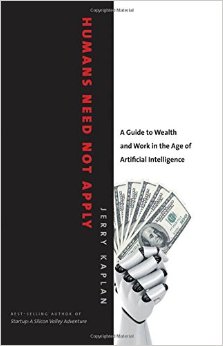
Will bots rule the world? According to Jerry Kaplan, the question is ill posed. In his book, Humans need not apply, Kaplan makes the case that it is a matter of when, not whether artificial intelligence will radically change the way we live and make a living. In fact, the revolution has begun: Algorithms invest side-by-side with humans in the stock market, decide what ads we consume online, and predict the prices we are willing to pay for goods on Amazon. The impact of this trend will be felt most and hardest, argues Kaplan, as more and more jobs are automatised and wealth is accumulated by the lucky few at the top that can capitalise on these advances.
But what does this mean for Psychologists? In a working paper, The future of employment: How susceptible are jobs to computerisation?, Frey and Osborne (2013) estimate the likelihood that over 700 jobs can “be sufficiently specified, conditional on the availability of big data, to be performed by state of the art computer-controlled equipment” and argue that about 50% of today’s employment in the US is at risk due to automatisation. However, their estimates suggest that Psychologists may not be affected by automation: Frey and Osborne establish a ranking of occupations and the Clinical, Counseling, and School Psychologists category ranks 24 out of 702 in the ranking of jobs least likely to be automatised, while Industrial-Organizational Psychologists and Psychologists, All other… rank 57 and 17, respectively.
The title of Kaplan’s book is borrowed from an equally sobering 15-minute video by CGP Grey that illustrates the broader issue of automatisation in the world of work and is available here.
Be the first to leave a comment. Don’t be shy.